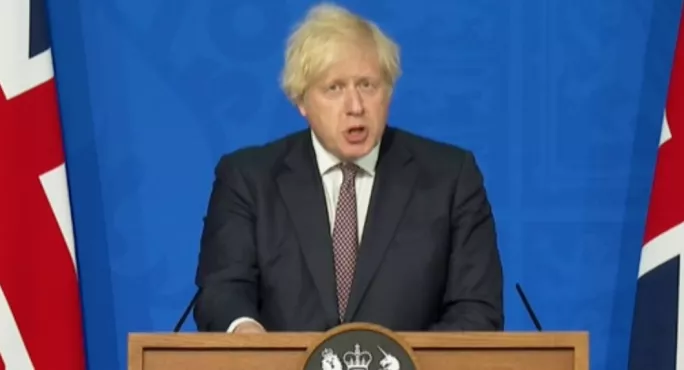Covid: School bubbles ‘to be scrapped from 19 July’

Boris Johnson has confirmed that there will be a “new regime” to avoid school bubble groups having to self-isolate if they come into contact with Covid cases.
Setting out the government’s plans to “live with Covid”, the prime minister said that education secretary Gavin Williamson will be making an announcement tomorrow on ending bubbles and the need to self isolate in schools.
And speaking in Parliament this afternoon health secretary Sajid Javid told MPs the plan was to remove bubbles and the need for schools to carry out routine contract tracing for Covid cases on 19 July.
Mr Johnson also suggested that the government’s plan to reopen society in the weeks ahead would be helped by the arrival of the school holidays which he described as a “firebreak.”
Speaking at a press conference this evening, he said: “We’re looking to move to a different regime for fully vaccinated contacts of those testing positive and also for children, and tomorrow the education secretary will announce our plans to maintain key protections that remove bubbles and contact isolation for pupils.”
He added that “obviously the way forward is by testing rather than by sending the bubbles home”.
Covid and schools: Removing the rules on bubbles
Answering a question in parliament this afternoon, Mr Javid said: “I can confirm that on July 19 it is our plan to remove bubbles and to end the requirement for early year settings, schools and colleges to routinely carry out contact tracing.”
During the press conference, the government’s chief scientific adviser, Sir Patrick Vallance, was asked about whether vaccinating pupils would be necessary.
He said that the Joint Committee on Vaccination and Immunisation was currently balancing the “relative risks to the individual from vaccination versus the relative benefits in terms of avoiding the problems associated with Covid” for children, and said that its findings were not yet ready to share.
Chief medical officer Professor Chris Whitty acknowledged there was a “mixed” view among scientists on the timing of lifting restrictions, but said that he had “quite a strong view” that doing so in summer had advantages over autumn.
He said: “There is quite a strong view by many people, including myself actually, that going in the summer has some advantages, all other things being equal, to opening up into the autumn when schools are going back and when we’re heading into the winter period when the NHS tends to be under greatest pressure for many other reasons.”
The NEU teaching union criticised the announcement on relaxing restrictions in schools, describing it “neglectful and reckless decision-making”.
Mary Bousted, joint general secretary of the NEU, said: “Schools and colleges are doing everything they can to keep young people and the wider community safe. We must seriously question the wisdom of the government’s decision to take away so many safety measures.
“These mitigations are being removed at a time when cases are rising, school outbreaks are at the highest level all year and rising sharply, and children remain unvaccinated and at risk of transmitting the virus and suffering long Covid themselves.”
Geoff Barton, general secretary of the Association of School and College Leaders, said: “We are pleased that the prime minister has confirmed that the government’s current set of rules over Covid management in schools and colleges will change as part of the easing of restrictions under step 4 of the roadmap.
“The current requirement for close contacts of positive cases to be traced and asked to self-isolate is resulting in significant educational disruption on top of the disruption that children and young people have already experienced over the past 15 months.
“Given the rollout of the vaccine programme to the adult population, it is no longer acceptable that children and young people should continue to pay such a heavy price in managing transmission of the virus.”
Mr Barton added: “We look forward to the education secretary’s statement tomorrow about exactly how the rules for schools and colleges will change. We will be studying these plans in detail to ensure that there is absolute clarity, to raise any concerns from our members, and to ensure that any practical implications for schools and colleges are ironed out as soon as possible.”
Nick Brook, deputy general secretary of the NAHT school leaders’ union, said: “To maintain public confidence the government need to explain clearly to parents and schools alike why arrangements we were told were critical to maintaining pupil safety until now, are no longer needed going forward, despite the soaring infection rates in schools.
“No school wants to see restrictions in place any longer than they have to be, but we must ensure that in relaxing rules now we do not create further longer term disruption in the months to come.”
Mr Williamson had already indicated that the government was looking to relax restrictions around the need to self-isolate and the use of school bubbles.
Last week he said: “I am working with the health secretary, alongside scientists and public health experts, to relax Covid measures in schools in line with wider work to remove restrictions across society.
“I’ll be looking closely at the issues around the need for ongoing isolation of bubbles and the outcomes of the daily contact testing trial, as we consider a new model for keeping children in education.”
You need a Tes subscription to read this article
Subscribe now to read this article and get other subscriber-only content:
- Unlimited access to all Tes magazine content
- Exclusive subscriber-only stories
- Award-winning email newsletters
Already a subscriber? Log in
You need a subscription to read this article
Subscribe now to read this article and get other subscriber-only content, including:
- Unlimited access to all Tes magazine content
- Exclusive subscriber-only stories
- Award-winning email newsletters
topics in this article



